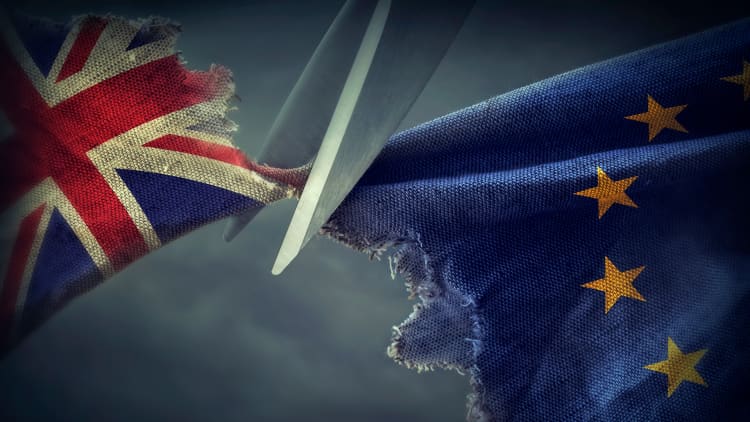
British Prime Minister Boris Johnson has delayed a decision on his Brexit legislation after U.K. lawmakers rejected his plan to rush it through the House of Commons in three days.
Members of Parliament (MPs) had supported his Withdrawal Agreement Bill on Tuesday evening, but almost immediately voted against the timetable.
It has significantly reduced the chances that the world's fifth-largest economy will leave the EU on October 31, as planned — something the prime minister had vowed to deliver "do or die, come what may."
European Council President Donald Tusk, who is leading the extension discussions with the different EU leaders, has said he hopes to find an agreement on an extension to January 31 through "written procedure."
This would allow members of the EU to agree to the move without holding an emergency summit.
Media reports in the U.K. suggest that Downing Street will push for an election if the Brexit deadline is delayed until the end of January next year.
Johnson tried to 'bully and bulldoze' MPs
"Generally speaking, one would expect that a measure of this importance would take about two months to get through Parliament," Dominic Grieve, an independent U.K. lawmaker, told CNBC's Willem Marx on Wednesday.
The former attorney general was one of 21 Conservative MPs ousted from the ruling Conservative Party in September. A vocal proponent of a second confirmatory referendum, Grieve is also an advocate for greater parliamentary control over Brexit.
"By insisting that this bill had to be got through the House of Commons in three days, rather than what one would expect (would be) a period of several weeks, the prime minister was giving the impression that he was trying to bully and bulldoze people into accepting something without proper scrutiny," Grieve said.
"That's why the House of Commons pushed back. I still don't understand why the prime minister didn't try to compromise on this. It seems that his deadline date of leaving on the 31 of October mattered so much to him, that he was insistent that it had to be observed."
"And it was never, in my view, going to be possible to do that … So, in one way, I think he has created a completely artificial crisis," he added.
Johnson has said he still believes it would be in the "best interests of this country and of democracy to get Brexit done" by October 31.
Is October 31 now just Halloween?
Sterling traded at around $1.2871 on Wednesday afternoon, little changed from the previous session.
The pound has been trending lower since breaking above $1.30 late last week as Johnson sealed his agreement with Brussels.
Speaking in the House of Commons during Prime Minister's Questions on Wednesday, Ken Clarke, the veteran former Conservative cabinet minister, said: "Will my right honorable friend get over his disappointment and accept that 31 October is now Halloween?"

"It is devoid of any symbolic or political content and will fade away into historical memory very rapidly," Clarke said, before taking his seat next to the former prime minister Theresa May.
Standing up to reply to Clarke, Johnson said: "We cannot know what the EU will do in response to the request from Parliament — I stress it wasn't my request — to ask for a delay."
"I intend to press on but I'm afraid we now have to see what our EU friends will decide on our behalf," Johnson said.
Where do we go from here?
Kallum Pickering, a senior economist at Berenberg, said in a research note that one of two things would happen next.
The first option would see Johnson try to get MPs to back an accelerated timetable for his legislation.
The prime minister "may hope that the Brexit weary opposition MPs in pro-Brexit constituencies will help him get his deal through Parliament soon.
The alternative for them is an election in which they could be unseated by Brexit Party or Conservative Party candidates," Pickering said.
Alternatively, the second option would see Johnson pull his Brexit legislation and "push for an election."
This could see Johnson call a vote of confidence in his own government, according to Pickering. That's because the House of Commons, which has already rejected calls for an election on two separate occasions, may do so again.
"Roughly six weeks are needed to hold elections in the U.K. (and) with a Brexit deal in his hand, Johnson would likely do well in a snap election. An orderly Brexit at the end of January 2020 would, therefore, be the most likely outcome of a snap election, in our view," Pickering said.



